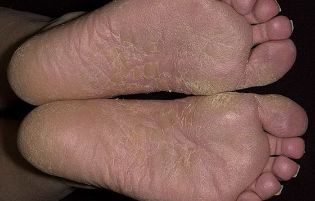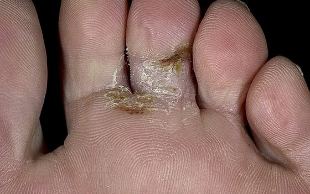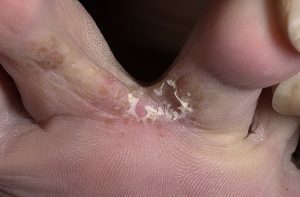Foot fungus (athlete's foot, ringworm) is an infection in which the skin lesions of the feet, fingers, interdigital areas. Often the pathology is combined with a lesion of the nails – onychomycosis. Cause fungal infection of microscopic fungi dermatophytes, molds and yeast strains.

If untreated, the fungus spreads from the feet to the entire limb. This increases the risk of development of erysipelas, the formation of warts and the frequency of allergic reactions of the skin and mucous membranes. The body stops to take antibiotics, which complicates treatment of other diseases.
Causes of foot fungus
Contagious foot fungus usually cause fungi-Ascomycota. Some strains cause rubrofitii and rubromikoz, occupying more than 70% of the diagnoses on the fungus. About 10% of the total population of the planet suffers from athlete's foot.
Molds and yeast-like fungi affect the limbs less frequently, they account for 1.5% of cases.
For what reasons is the infection of foot fungus:
- Somatic pathology.
- Endocrine disorders.
- Hypothermia of the feet.
- Diabetes with the symptom of diabetic foot.
- Dermatological diseases – psoriasis, neurodermatitis, eczema.
- Hallux valgus and other foot pathology.
- Visit public places where you have to walk barefoot (saunas, pools, fitness centres).
- Excessive sweating of the skin of the feet (hyperhidrosis congenital or due to other diseases).
- Reduced immunity in children and the elderly. In the 2nd group of patients with a fungus, often face men, if the nails on their feet are already affected with onychomycosis.
- The misuse of antibiotic therapy, corticosteroids, cytostatics, immunosuppressive agents. Factor adversely affects the immune system and increases the incidence of fungal infection.
- A professional factor in the development of mycosis means infection of employees baths, swimming pools, metallurgical and coal industry, athletes, soldiers.
- Injury to the skin leading to the appearance of calluses, cracks, corns.
Favorite places to stop for a fungus followed by the formation of warts become sites of corns and hyperkeratosis. Localization is caused by the deterioration of local immunity, loss of control over the development of human papillomavirus infection.
Clinical forms of foot fungus
External symptoms of foot fungus vary depending on the type of strain that initiated the process, and the degree of involvement of the skin, nails and leg hair. Athlete and rubromikoz have similar current, so the doctors put them in the "athlete's foot".

Types of foot fungus dermatologists are the following:
- Scaly.
- The presence of skin lesions, similar to diaper rash).
- Not performance sweat glands.
- Onychomycosis flowing through normotroficheskie, atrophic or hypertrophic type.
Describe what it looks like a foot fungus in the squamous form. At the initial stage of redness and peeling. Altered areas have different areas. Itching does not occur in all patients.
Most patients do not notice any signs of athlete's foot. In the clinic, they do not apply, and it gives pathology the opportunity to change a scaly form on disgidroticheskaya.
When disgidroticheskaya the foot fungus visible symptoms will be multiple vesicles with a diameter of 2 – 8 mm. They coalesce into large pockets, are opened to form erosion.
With the arch of the foot the fungus spreads on the outer and inner sides. In addition to extensive erosion, in place of the bursting of blisters formed diaper rash. Patients complain of soreness and itching and notice the peeling.
If untreated, a fungal infection is complicated by bacterial. Signs of secondary infection are the clouding of the contents of the bubbles with the transformation into a purulent mass, increase in body temperature, swelling and significant redness.
Intertriginosny foot mycosis is the most common. It develops either independently or in the background of the squamous shape. Affects the skin between fingers 4 and 5 feet, rarely develops in the space between the 3 and 4 fingers.
The main symptoms intertriginous foot fungus:
- Itching and burning sensation.
- Cracks on the skin in a white bezel (the border is formed from the peeling of the epidermis).
- Oozing between the toes of the affected limb.
- Replacement cracks erosions with strong painful areas.
- Loosening of the skin, with subsequent reduction of local immunity. In the loose structure of the streptococci penetrate and cause inflammation of the skin with pus. Tissues swell, redden, increasing the pain. The General condition of the patient deteriorates.
Symptoms of Candida of the foot lesion are interdigital erosion, resulting from over activity of a fungus of the genus Candida. Altered foci are visible between 3 and 4 or 4 and 5 fingers of the lower extremities.
Sore skin becomes swollen. From healthy tissues, it separates the "belt" of the epidermis, which has disappeared. Problematic neighbourhood make up the pustules and bubble rash.
If the fungus attacks the nails on the toes, the patient is diagnosed as "onychomycosis". At the initial stage of pathology in the free edge of the nail of the big toe are yellow stripes and spots. Hypertrophic onychomycosis is characterized by thickening and brittleness of the plate, which can be seen sloughing of the skin.

In atrophic collapses onychomycosis of the nail structure. Under the modified plate hardened exposed skin. If onychomycosis develops due to lesions of the foot mold, the nail plate becomes brown, black, green or yellow color. The process is accompanied by paronychia – purulent inflammation of the nail bed.
Diagnosis and treatment of foot mycosis
To the foot fungus treatment was conducted as efficiently as possible, a physician should visit at the first signs of the disease. Since symptoms of fungal infection are non-specific and coincide with the clinical picture of other dermatological diseases, a specialist needs to differentiate it from psoriasis, dermatitis, eczema and systemic lupus erythematosus.
To identify the causative organism and determine its belonging to any class of fungi, the patient is carried out:
- Scraping of the nail.
- Microscopy.
- Microbiological study.
- DNA screening material.
Deciding how to treat foot fungus or space between the fingers and nails, a dermatologist is considering the feasibility of systemic and combination therapy.
But without fail, the patient receives the appointment in relation to the external treatment. The basis of antimycotic therapy is the use of antifungal agents diverse effects and medicines to improve local blood circulation, and eliminate comorbidities.
To prevent reinfection, the patient is advised disinfection of personal belongings and household accessories of common use.
System foot fungus treatment
The products of the system action tablets and capsules for athlete shown with moderate and severe process. Because of the many side effects their reception is carried out under strict medical supervision.
For removing fungus from the foot antifungals administered to two groups:
- The azole.
- Allylamines.
Also in the treatment of athlete's foot find the use of antifungal agents with fungicidal effect. They work on growth suppression and complete destruction of parasites.
Antifungals local action
In considering how to treat foot fungus, we should also say about the effectiveness of the use of drugs local action. The simplicity of the treatment of skin and provides a multitude of dosage forms of antifungals. It ointments, lotions, sprays, creams, drops and powder against foot fungus.
In the complete defeat of the nail appoint its removal. The goal is to deduce a colony of fungi that spoiled the plate, and increase the efficiency of use of antifungal ointments. Deletion is carried out either surgically sterile, or using plasters and ointments, anti-fungus capable of destroying the affected nail.
Antifungal traditional medicine
According to dermatologists, folk remedy for foot fungus without pharmacy medicines valid to use in the early stages of mycosis when there are no pronounced symptoms. In other cases, traditional medicine can only Supplement the core medical prescription. An integrated approach guarantees the patient a quick repayment of inflammatory foci and support local immunity.
Recipes home treatment of athlete's foot with the help of folk remedies:

- Wash with herbal decoction. Oak bark, dry berries blackberries, grass, verbena and calendula flowers mixed in equal amounts.3 tbsp phyto collection boil on a slow fire, 200 ml of water. After 20 minutes, the composition is filtered and in the form of heat is used for washing the problem areas and applying compresses.
- Ointment of ash wood. Sifted wood ash combine with pork fat to make a thick greasy mass. Feet the product is applied morning and evening after cleansing routine.
- Ointment of copper sulphate and sulphur yellow. The drug is prepared in fat pig, mix the ingredients in equal amounts. Mass bring to a boil, then take to a dark room and wait until it cools down. Leg handling sulphur-vitriol ointment exercise several times a day.
- Baths with milk and tea. An armful of fresh herbs pour 2 – 3 liters of boiling water and wrap up the capacity of the old blanket. After 3 to 4 hour infusion of the plant is filtered and used for foot baths. Session time is 45 minutes. The bath takes place once every 2 – 3 days while the fungal infection will not come down.
- Coffee baths. If you are looking for a simple recipe for "how to treat foot fungus at home" come to the rescue of instant coffee. Drink firmly steeped in the right amount of water poured into the basin and soar feet. The number of treatments – 1 – 2 a day. Task – to destroy pathogenic flora and eliminate the unpleasant odor that exudes the affected feet.
- Baths with wine vinegar. Before bed wash your feet with warm water and placed in a basin with a strong solution of wine vinegar. After 3 – 5 minutes and wipe the feet wear socks soaked in this solution. The procedure gives antiseptic effect.
Additionally, it is necessary to disinfect the floors of rooms and a bath, shower and toilet. In the future, it is desirable to avoid staying in wet conditions of the common areas.
Prevention
The best preventative measure in combating the fungus that can prevent the disease — the strengthening of the protective properties of the organism. This method is inexpensive, however, the most effective and efficient. Medical and traditional treatments must be agreed with the doctor, any medication could provoke dangerous complications, which then fight a lot harder and longer.
To avoid reinfection it is necessary to observe rules of personal hygiene, be sure to disinfect bedding and towels that were in use. In order that the treatment was timely and effective, it is necessary to consult a doctor.





























